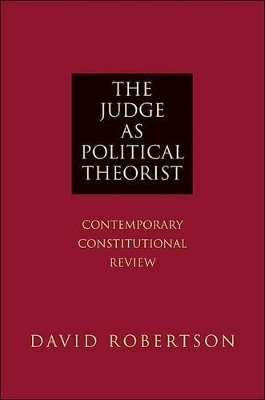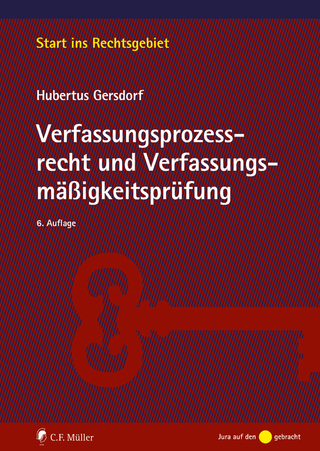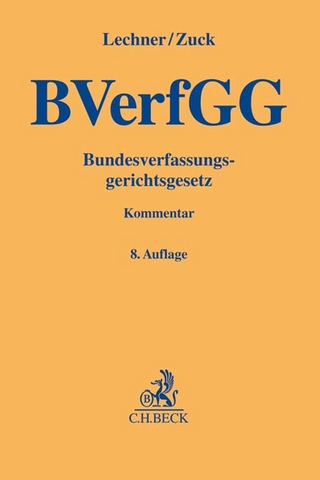
The Judge as Political Theorist
Contemporary Constitutional Review
Seiten
2010
Princeton University Press (Verlag)
978-0-691-14404-7 (ISBN)
Princeton University Press (Verlag)
978-0-691-14404-7 (ISBN)
Examines opinions by constitutional courts in liberal democracies to better understand the logic and nature of constitutional review. This book argues that the constitutional judge's role is nothing like that of the legislator or chief executive, or even the ordinary judge.
The Judge as Political Theorist examines opinions by constitutional courts in liberal democracies to better understand the logic and nature of constitutional review. David Robertson argues that the constitutional judge's role is nothing like that of the legislator or chief executive, or even the ordinary judge. Rather, constitutional judges spell out to society the implications--on the ground--of the moral and practical commitments embodied in the nation's constitution. Constitutional review, in other words, is a form of applied political theory. Robertson takes an in-depth look at constitutional decision making in Germany, France, the Czech Republic, Poland, Hungary, Canada, and South Africa, with comparisons throughout to the United States, where constitutional review originated. He also tackles perhaps the most vexing problem in constitutional law today--how and when to limit the rights of citizens in order to govern. As traditional institutions of moral authority have lost power, constitutional judges have stepped into the breach, radically altering traditional understandings of what courts can and should do.
Robertson demonstrates how constitutions are more than mere founding documents laying down the law of the land, but increasingly have become statements of the values and principles a society seeks to embody. Constitutional judges, in turn, see it as their mission to transform those values into political practice and push for state and society to live up to their ideals.
The Judge as Political Theorist examines opinions by constitutional courts in liberal democracies to better understand the logic and nature of constitutional review. David Robertson argues that the constitutional judge's role is nothing like that of the legislator or chief executive, or even the ordinary judge. Rather, constitutional judges spell out to society the implications--on the ground--of the moral and practical commitments embodied in the nation's constitution. Constitutional review, in other words, is a form of applied political theory. Robertson takes an in-depth look at constitutional decision making in Germany, France, the Czech Republic, Poland, Hungary, Canada, and South Africa, with comparisons throughout to the United States, where constitutional review originated. He also tackles perhaps the most vexing problem in constitutional law today--how and when to limit the rights of citizens in order to govern. As traditional institutions of moral authority have lost power, constitutional judges have stepped into the breach, radically altering traditional understandings of what courts can and should do.
Robertson demonstrates how constitutions are more than mere founding documents laying down the law of the land, but increasingly have become statements of the values and principles a society seeks to embody. Constitutional judges, in turn, see it as their mission to transform those values into political practice and push for state and society to live up to their ideals.
David Robertson is professor of politics and a fellow of St. Hugh's College at the University of Oxford. His books include "A Dictionary of Human Rights" and "Judicial Discretion in the House of Lords".
Preface ix Chapter One: The Nature and Function of Judicial Review 1 Chapter Two: Germany: Dignity and Democracy 40 Chapter Three: Eastern Europe: (Re)Establishing the Rule of Law 83 Chapter Four: France: Purely Abstract Review 143 Chapter Five: Canada: Imposing Rights on the Common Law 187 Chapter Six: South Africa: Defining a New Society 226 Chapter Seven: Tests of Unconstitutionality and Discrimination 281 Chapter Eight: Conclusions: Constitutional Jurists as Political Theorists 347 Cases Cited 385 Bibliography 393 Index 407
| Erscheint lt. Verlag | 21.7.2010 |
|---|---|
| Zusatzinfo | 3 tables. |
| Verlagsort | New Jersey |
| Sprache | englisch |
| Maße | 152 x 235 mm |
| Gewicht | 567 g |
| Themenwelt | Recht / Steuern ► EU / Internationales Recht |
| Recht / Steuern ► Öffentliches Recht ► Verfassungsverfahrensrecht | |
| Sozialwissenschaften ► Politik / Verwaltung ► Politische Theorie | |
| Sozialwissenschaften ► Politik / Verwaltung ► Vergleichende Politikwissenschaften | |
| ISBN-10 | 0-691-14404-4 / 0691144044 |
| ISBN-13 | 978-0-691-14404-7 / 9780691144047 |
| Zustand | Neuware |
| Haben Sie eine Frage zum Produkt? |
Mehr entdecken
aus dem Bereich
aus dem Bereich
Buch | Softcover (2024)
C.F. Müller (Verlag)
20,00 €


